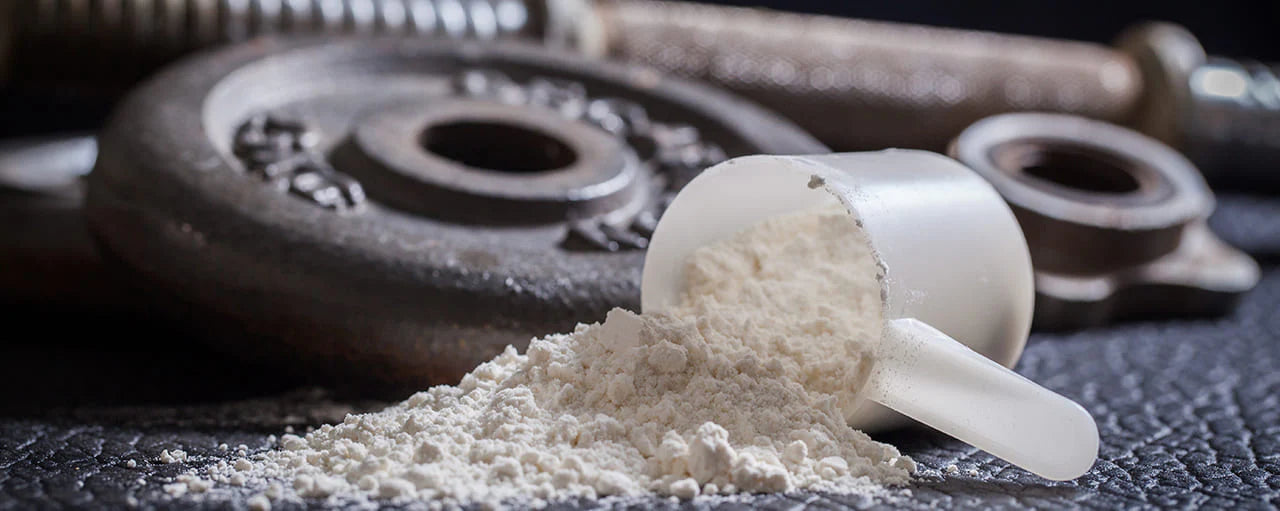Was bringt Whey Protein?
Shakes mit Whey Protein sind besonders bei Sportlern beliebt, die sich nach einem anstrengenden Workout regenerieren möchten. Die im Pulver enthaltenen Aminosäuren kurbeln die Proteinsynthese an und liefern den Muskeln weitere Energie.
Bei der Frage für was Whey Protein gut ist, kann man festhalten, dass es als hochwertige Proteinquelle den Muskelaufbau unterstützen kann und dass Whey Protein eine positive Wirkung in Bezug auf Blutdrucksenkung[¹] [²], Blutfette[³] und Diäten[⁴] haben kann.
Damit der Effekt des Whey Proteins sichtbar wird, ist die richtige Dosierung wichtig. Die optimale Dosierung hängt dabei von den Zielen ab – je nachdem ob du Wert auf Muskelaufbau, Muskelerhalt oder Diät legst. Ideal sind 30 Gramm Pulver pro Anwendung, das entspricht auch der Dosierungsempfehlung bei unserem ESN Designer Whey. Man sollte bei der Berechnung des persönlichen Proteinbedarfs aber auch die Aufnahme von Eiweiß über andere Proteinquellen in der Ernährung miteinbeziehen.
Nimmst du zu viel Whey Protein zu dir, kann es zu Verdauungsproblemen kommen. Sie stehen häufig in Verbindung mit einer Unverträglichkeit von Laktose.[⁵] Erfahre mehr über das Thema Whey Protein und Laktose.
Exzellente Quelle für hochwertiges Protein
Die Grundlage für Whey Protein ist das Molkenprotein der Milch. Das Pulver aus Molke kommt in unterschiedlicher Wertigkeit und Darreichungsformen vor. Dabei unterscheidet man die Formen Whey Konzentrat, Whey Protein Isolat und Whey Hydrolysat.
Whey Protein ist ein Protein mit hoher Wertigkeit, dass alle essenziellen Aminosäuren enthält.[⁶] Der Körper kann es gut verdauen und es wird im Vergleich zu anderen Arten von Eiweiß schnell aus dem Darm aufgenommen.[⁷] Alle diese Eigenschaften machen Whey Protein zu einer der besten Proteinquellen für dich.
Was bringt Whey Protein für den Muskelaufbau?
Dein Körper verändert sich im Laufe der Jahre, vor allem die Muskelmasse nimmt mit dem Alter ab.[⁸] Mit einer Kombination aus Krafttraining und angemessener Ernährung kann dieser Prozess teilweise verlangsamt, verhindert oder sogar umgekehrt werden: Krafttraining in Verbindung mit dem Verzehr von proteinreichen Lebensmitteln oder Protein-Nahrungsergänzungen hat sich dabei als wirksame Präventionsstrategie erwiesen.[⁹]
Besonders effektiv sind hochwertige Proteinquellen, wie z. B. Molke, die reich an der verzweigtkettigen Aminosäure Leucin sind. Whey Protein hat dank Leucin eine anabole Wirkung – Leucin ist die Aminosäure, die am stärksten den Muskelaufbau fördert.[¹⁰]
Whey Protein kann dazu beitragen, den Blutdruck zu senken
Stark erhöhter Blutdruck (Hypertonie) ist einer der am meisten verbreiteten Risikofaktoren für Herzerkrankungen.[¹¹] Mit einer ausgewogenen Ernährung kann man dieser Vorbelastung entgegenwirken: So kann zum Beispiel der Verzehr von Whey Protein eine positive Wirkung auf den Blutdruck haben. Zahlreiche Studien haben den Konsum von Produkten, die Milch enthalten, mit einer Senkung des Blutdrucks in Verbindung gebracht.[¹²] [¹³]
So zeigte beispielsweise eine Studie an Personen mit erhöhtem Körpergewicht, dass eine Einnahme von Whey Protein (54 Gramm / Tag über 12 Wochen), den systolischen Blutdruck um 4 Prozent senkte. Andere Milchproteine wie Casein hatten ähnliche Effekte.[¹⁴]
Whey Protein kann eine positive Wirkung auf Blutfettwerte haben
Whey Protein kann ebenso eine Wirkung auf die Blutfettwerte haben. Ein hoher Cholesterinspiegel, insbesondere LDL-Cholesterin, ist ein Risikofaktor für Herzerkrankungen.[¹⁵] In einer Studie an Personen mit erhöhtem Körpergewicht führte die Einnahme von 54 Gramm Molkenprotein pro Tag über 12 Wochen zu einer signifikanten Reduzierung des Gesamt- und LDL-Cholesterins (das "schlechte" Cholesterin) im Körper.[¹⁶]
Andere Studien fanden keine ähnlichen Effekte auf den Cholesterinspiegel im Blut, aber der fehlende Effekt könnte auch auf Unterschiede im Studienaufbau zurückzuführen sein.[¹⁷] [¹⁸] Bevor endgültige Schlussfolgerungen gezogen werden können, sind weitere Studien erforderlich.
Hält Whey Protein länger satt?
Nicht nur zum Muskelaufbau sind Proteinshakes mit Whey Protein sehr beliebt. Die Einnahme von Whey Protein kann auch eine positive Wirkung bei Diäten haben, denn Whey in Form von Pulver oder Proteinshakes kann dazu beitragen, dass man länger satt bleibt.
Einige Lebensmittel sind sättigender als andere: Ein Effekt, der teilweise durch ihre Makronährstoffzusammensetzung (Eiweiß, Kohlenhydrate, Fett) zu Stande kommt. Protein ist bei weitem der sättigendste der drei Makronährstoffe.[¹⁹] Allerdings haben nicht alle Proteine den gleichen Effekt auf die Sättigung. Molkenprotein scheint sättigender zu sein als andere Proteinarten wie beispielsweise Casein und Soja Protein.[²⁰] [²¹]
Diese Eigenschaften machen es besonders nützlich für diejenigen, die weniger Kalorien essen und Gewicht verlieren möchten – Proteinshakes sind zum Abnehmen geeignet und somit nicht nur für Sportler interessant.
Wer profitiert besonders von der Whey Protein Wirkung?
Generell eignet sich die Einnahme von Whey Protein für jeden, der seine Proteinzufuhr nicht ausreichend über die Ernährung decken kann und sie deshalb mit Proteinpulver & Co. ergänzen möchte. Die regelmäßige Einnahme des Molkenproteins über den Konsum von Eiweißpulver eignet sich aber auf jeden Fall besonders für hart trainierende Sportler, die nach dem Training ihren Vorrat an Eiweiß wieder auffüllen möchten.
Haben die verschiedenen Whey Proteine eine unterschiedliche Wirkung?
Alle Whey Proteine haben grundsätzlich die gleiche Wirkung, unterscheiden sich aber in ihren Eigenschaften:
- Whey Protein Konzentrat (WPC): Das Konzentrat aus Molkenprotein wird über spezielle Filtration aus der Molke hergestellt. Es ist die kostengünstigste Whey Protein Variante. Der Proteingehalt von Whey Protein Konzentrat liegt zwischen 70 und 80 Prozent, bei einem niedrigen Fett- und Kohlenhydrat-Anteil. Das Konzentrat enthält bei einfacher Filtration noch relativ viel Laktose, was sich negativ auf die Verträglichkeit auswirken kann. Bei ultrafiltriertem Whey Protein werden dem Whey Protein zuerst die Laktose, dann das Fett und schließlich die Mineralien entzogen. Dadurch entsteht ein sehr hochwertiges Protein mit einem niedrigen Laktose- und Fett-, aber einem sehr hohen Proteinanteil.
- Whey Protein Isolat (WPI): Das Isolat enthält zwischen 90 und 96 Prozent Protein und wird durch Mikrofiltrationsverfahren gewonnen. Whey Protein Isolat enthält wesentlich weniger Laktose, Fett und Kohlenhydrate als das WPC. Es ist daher gut geeignet für eine kohlenhydratarme Ernährung. Die Herstellung des Isolats ist um einiges aufwändiger und teurer als beim Whey Protein Konzentrat, daher ist es auch im Preis etwas höher. Der Mehrpreis lohnt sich: Das Isolat steht aufgrund der noch kürzeren Proteinketten dem Körper bereits innerhalb weniger Minuten zur Verfügung.
- Whey Protein Hydrolysat (WPH): Das Hydrolysat wird durch Aufspaltung der Enzyme (Hydrolyse) aus dem Whey Protein Isolat gewonnen. Dabei werden die Bausteine des Eiweiß in ihre kleinsten Bestandteile zerlegt: die Peptide. Sie können noch viel schneller und effizienter vom Organismus aufgenommen werden. Das Hydrolysat hat eine sehr aufwändige Herstellung und ist deshalb hochpreisiger. Das Hydrolysat hat zudem einen relativ bitteren Geschmack, weshalb es nicht so beliebt wie das Whey Protein Konzentrat oder Isolat ist.
Hat Whey Protein Nebenwirkungen?
Jetzt weißt du, wofür Whey Protein gut ist, aber bringt es auch Nebenwirkungen mit sich? Die einzigen Nebenwirkungen, die bei Whey Protein auftreten können, sind Reaktionen aufgrund einer „Überdosis“. Meistens handelt es sich dabei um Verdauungsprobleme wie Blähungen, Magenkrämpfe oder Durchfall – hervorgerufen durch die Unverträglichkeit der im Whey Protein enthaltenen Laktose.[²²] Auch Menschen mit einer Kuhmilchallergie müssen hier Vorsicht walten lassen – durch die im Whey enthaltene Milch können allergische Reaktionen auftreten. Erfahre mehr über die Nebenwirkungen von Whey Protein.
Am besten hältst du dich immer an die Verzehrempfehlung auf der Verpackung des Proteinpulvers und denke daran, die tägliche Proteinzufuhr von rund 2 Gramm pro Kilogramm Körpergewicht nicht zu überschreiten.[²³]
Fazit zur Whey Protein Wirkung
Letztendlich ist Molkenprotein nicht nur eine bequeme Möglichkeit, die Proteinzufuhr zu erhöhen, es kann auch einige gesundheitliche Vorteile haben – sei es zur Versorgung der Muskeln beim Muskelaufbau, bei einer Diät oder zur positiven Beeinflussung von Blutfettwerten und Blutdrucksenkung.
Um von der Wirkung von Whey Protein als Shake oder Pulver in Speisen zu profitieren, solltest du auch auf die Qualität des Proteinpulvers achten. Kaufe nur hochwertiges Eiweißpulver und achte dabei darauf, dass es idealerweise einen hohen Proteingehalt aufweist. Egal, für welchen Zweck du Proteinpulver und Whey Protein verwenden möchtest: Sportler finden bei ESN für jedes persönliche Ziel das passende Whey Protein!
Quellen:
[1] https://pubmed.ncbi.nlm.nih.gov/19369377/
[2] https://pubmed.ncbi.nlm.nih.gov/18259007/
[3] https://pubmed.ncbi.nlm.nih.gov/19893505/
[4] https://pubmed.ncbi.nlm.nih.gov/18469287/
[5] https://www.sciencedirect.com/science/article/pii/B9780128097625000164
[6] https://www.ncbi.nlm.nih.gov/pmc/articles/PMC3905294/
[7] https://pubmed.ncbi.nlm.nih.gov/9405716/
[8] https://www.ncbi.nlm.nih.gov/pmc/articles/PMC6442923/
[9] https://pubmed.ncbi.nlm.nih.gov/19057193/
[10] https://pubmed.ncbi.nlm.nih.gov/16365087/
[11] https://www.ncbi.nlm.nih.gov/pmc/articles/PMC8162166/
[12] https://pubmed.ncbi.nlm.nih.gov/19369377/
[13] https://pubmed.ncbi.nlm.nih.gov/18259007/
[14] https://pubmed.ncbi.nlm.nih.gov/19893505/
[15] https://www.ncbi.nlm.nih.gov/pmc/articles/PMC6813799/
[16] https://pubmed.ncbi.nlm.nih.gov/19893505/
[17] https://www.sciencedirect.com/science/article/abs/pii/S095869461000141X
[18] https://pubmed.ncbi.nlm.nih.gov/19153580/
[19] https://pubmed.ncbi.nlm.nih.gov/18469287/
[20] https://pubmed.ncbi.nlm.nih.gov/19385022/
[21] https://pubmed.ncbi.nlm.nih.gov/24801369/
[22] https://www.sciencedirect.com/science/article/pii/B9780128097625000164
[23] https://examine.com/guides/protein-intake/#how-much-protein-do-you-need-per-day








